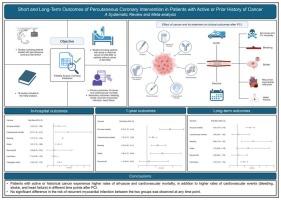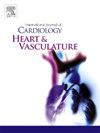有活跃或既往癌症病史的患者经皮冠状动脉介入治疗的短期和长期结果:一项系统回顾和荟萃分析
IF 2.5
Q2 CARDIAC & CARDIOVASCULAR SYSTEMS
引用次数: 0
摘要
背景:由于心血管并发症发生率的增加,经皮冠状动脉介入治疗(PCI)在有活跃或既往癌症病史的患者中的应用面临挑战。因此,我们的目的是评估死亡率,以及这一高危人群的早期和长期不良心血管结局。方法对PubMed、Cochrane和Scopus数据库进行系统的文献检索,以确定有活跃或既往癌症病史的患者与无癌症患者的临床结果进行比较。我们的主要结局是不同时间点的全因死亡率和心血管死亡率。次要结局包括两组之间的出血、卒中、复发性心肌梗死(MI)和心力衰竭事件。结果共纳入18项研究,共纳入800万例患者。与没有癌症病史的患者相比,活跃或既往癌症病史与住院全因死亡率(RR: 1.43; 95% CI: 1.03-1.99; p = 0.03)、1年全因死亡率(RR: 2.35; 95% CI: 1.75-3.16; p < 0.001)以及1年心血管死亡率(RR: 1.35; 95% CI: 1.15-1.59; p < 0.001)增加相关。与无癌症患者相比,有活跃或既往癌症病史的患者住院(RR: 1.77; 95% CI: 1.75-1.79; p < 0.001)、1年(RR: 1.63; 95% CI: 1.26-2.11; p < 0.001)和长期出血事件(RR: 2.08; 95% CI: 1.30-3.35; p < 0.003)的发生率更高。两组在心肌梗死复发方面无显著差异。结论:积极或既往癌症病史对PCI患者的早期和长期临床结果有负面影响。这些发现强调了个体化和多学科方法在治疗高危人群时的重要性。本文章由计算机程序翻译,如有差异,请以英文原文为准。

Short and long-term outcomes of percutaneous coronary intervention in patients with active or prior history of cancer: a systematic review and meta-analysis
Background
Percutaneous coronary intervention (PCI) in patients with active or prior history of cancer presents a challenge due to the increased rates of cardiovascular complications. Therefore, we aimed to evaluate the mortality rates, in addition to early and long-term adverse cardiovascular outcomes in this high-risk population.
Methods
A systematic literature search was conducted across PubMed, Cochrane, and Scopus databases to identify eligible studies comparing clinical outcomes between patients with active or prior history of cancer and patients without cancer. Our primary outcomes were all-cause mortality and cardiovascular mortality at different time points. Secondary outcomes included bleeding, stroke, recurrent myocardial infarction (MI), and heart failure events between the two groups.
Results
Overall, 18 studies with a total of 8 million patients were included. Active or prior history of cancer was associated with increased in-hospital all-cause mortality (RR: 1.43; 95 % CI: 1.03–1.99; p = 0.03), 1-year all-cause mortality (RR: 2.35; 95 % CI: 1.75–3.16; p < 0.001), as well as, increased 1-year cardiovascular mortality (RR: 1.35; 95 % CI: 1.15–1.59; p < 0.001) compared to patients without a history of cancer. Patients with active or prior history of cancer have higher rates of in-hospital (RR: 1.77; 95 % CI: 1.75–1.79; p < 0.001), 1-year (RR: 1.63; 95 %CI: 1.26–2.11; p < 0.001), and long-term bleeding events (RR: 2.08; 95 % CI: 1.30–3.35; p < 0.003) compared to patients without cancer. No significant differences were recorded regarding recurrent MI between the two groups.
Conclusions
Active or prior history of cancer was associated with a negative impact on early and long-term clinical outcomes in patients undergoing PCI. These findings underline the importance of individualized and multidisciplinary approaches when treating this high-risk population.
求助全文
通过发布文献求助,成功后即可免费获取论文全文。
去求助
来源期刊

IJC Heart and Vasculature
Medicine-Cardiology and Cardiovascular Medicine
CiteScore
4.90
自引率
10.30%
发文量
216
审稿时长
56 days
期刊介绍:
IJC Heart & Vasculature is an online-only, open-access journal dedicated to publishing original articles and reviews (also Editorials and Letters to the Editor) which report on structural and functional cardiovascular pathology, with an emphasis on imaging and disease pathophysiology. Articles must be authentic, educational, clinically relevant, and original in their content and scientific approach. IJC Heart & Vasculature requires the highest standards of scientific integrity in order to promote reliable, reproducible and verifiable research findings. All authors are advised to consult the Principles of Ethical Publishing in the International Journal of Cardiology before submitting a manuscript. Submission of a manuscript to this journal gives the publisher the right to publish that paper if it is accepted. Manuscripts may be edited to improve clarity and expression.
 求助内容:
求助内容: 应助结果提醒方式:
应助结果提醒方式:


